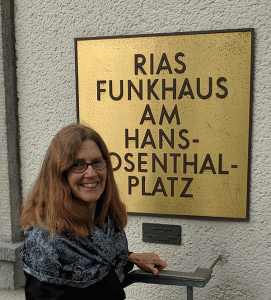Kathy Bradshaw, associate professor, spent a small portion of her summer in Germany and Belgium as a RIAS Berlin Kommission Fellow learning about politics, economics and broadcast journalism in Germany and Europe. With 11 commercial and public, local and network, radio and television broadcast journalists from the United States, Bradshaw, was the only academic fellow.
The RIAS Fellows heard presentations from commercial and government-supported television stations about news coverage and constraints.
One of the biggest, on-going stories in Germany has been the more than 1 million refugees accepted into a country of 80 million citizens.
The 12 Fellows visited refugee centers and talked with refugees and people helping them through the process of becoming German citizens. The refugees said they were eager to learn the German language and become productive contributors. The head of a German think tank explained current approaches to integrating the mostly Moslem and mostly Middle Eastern refugees into German society.
“The extraordinary compassion that moved German Chancellor Angela Merkel to admit the refugees is all the more remarkable when you consider the cost, the backlash, and the possible political cost to her,” Bradshaw said.
The first step is teaching refugees a level of German language proficiency sufficient to go to work. That coincides with preparing sometimes entirely homogeneous communities to welcome the German-speaking refugees. Bradshaw explained that they are figuring out this process on the fly. It has become more practical and more effective as it has been fine-tuned and as the flow of refugees has slowed, she said.
The Fellows learned about the terrorist threat in Germany from Thomas Volk of the Konrad-Adenauer-Stiftung. He described the threat of terrorism in Germany and offered an agenda for countering that threat.
His research showed that more than 700 people have traveled to Islamic State-controlled territory. In Germany, the Islamic State recruits on the Internet, in some mosques, through sports organizations, and in prisons.
He suggested the need for a nationwide program to counter the recruiting. “A historical-critical exegesis of the Quran, an expansion of Islamic religious education in schools, increased use of German as the medium in which sermons are delivered in mosques, employment of more Muslim chaplains [in prisons], as well as websites aimed at young people that promote considered Islam can counter the alarming trend of increasing Islamist radicalization,” he wrote.
The RIAS fellows had off-the-record briefings from the U.S. ambassador to Germany, a German official with national security responsibilities, NATO experts, and European Union officials. “Those briefings gave me a visceral appreciation for the way in which the U.S. geographic isolation from military threat has formed public views and of the vital importance of the NATO alliance,” Bradshaw said.
About her two-week experience, Bradshaw said the RIAS fellow was incomparable. “I was fortunate to be invited to attend the RIAS Kommission Awards, and I am grateful to have shared the experiences with journalists from across the U.S.,” she said.

